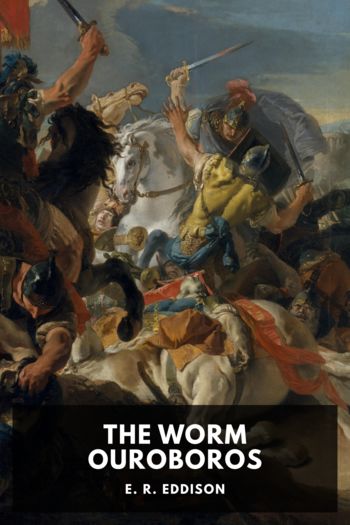The Worm Ouroboros by E. R. Eddison (nonfiction book recommendations TXT) 📕

- Author: E. R. Eddison
Book online «The Worm Ouroboros by E. R. Eddison (nonfiction book recommendations TXT) 📕». Author E. R. Eddison
Mevrian, as if she had all her part by rote, was leaned this while heavily upon Heming, hanging her head.
Heming could think on nought likelier to say, than, “Truly, O Corinius, we be sober.”
“Thou liest,” said Corinius. “ ’Twas ever sign manifest of drunkenness to deny it. Look you, my lords, I deny not I am drunk. Therefore is sign manifest I am drunk, I mean, sign manifest I am sober. But the hour calleth to other work than questioning of these high matters. Set on!”
So speaking he reeled heavily against Gro, and (as if moved by some airy influence that, whispering him of schemings afoot, yet conspired with the wine that he had drunken to make him look all otherwhere for treason than where it lay under his hand to discover it) gripped Gro by the arm, saying, “Bide by me, Goblin, thou wert best. I do love thee very discreetly, and will still hold thee by the ears, to see thou bite me not, nor go no more a-gadding.”
Being by such happy fortune delivered out of this peril, Heming and Mevrian with what prudent haste they might, and without mishap or hindrance, got them their horses and fared forth of the main gate between the marble hippogriffs, whose mighty forms shone above them stark in the low beams of the rising moon. So they rode silently through the gardens and the home-meads and thence to the wild woods beyond, quickening now their pace to a gallop on the yielding turf. So hard they rode, the air of the windless April night was lashed into storm about their faces. The trample and thunder of hoof-beats and the flying glimpses of the trees were to young Heming but an undertone to the thunder of his blood which night and speed and that lady galloping beside him knee to knee set a-gallop within him. But to Mevrian’s soul, as she galloped along those woodland rides, those moonlight glades, these things and night and the steadfast stars attuned a heavenlier music; so that she waxed momently wondrous peaceful at heart, as with the most firm assurance that not without the abiding glory of Demonland must the great mutations of the world be acted, and but for a little should their evil-willers usurp her dear brother’s seat in Krothering.
They drew rein in a clearing beside a broad stretch of water. Pine-woods rose from its further edge, shadowy in the moonshine. Mevrian rode to a little eminence that stood above the water and turned her eyes toward Krothering. Save by her instructed and loving eye scarce might it be seen, many miles away be-east of them, dimmed in the obscure soft radiance under the moon. So sat she awhile looking on golden Krothering, while her horse grazed quietly, and Heming at her elbow held his peace, only beholding her.
At last, looking back and meeting his gaze, “Prince Heming,” she said, “from this place goeth a hidden path north-about beside the firth, and a dry road over the marsh, and a ford and an upland horse-way leadeth into Westmark. Here and all-wheres in Demonland I might fare blindfold. And here I’ll say farewell. My tongue is a poor orator. But I mind me of the words of the poet where he saith:
My mind is like to the asbeston stone,
Which if it once be heat in flames of fire,
Denieth to becomen cold again.
Be the latter issue of these wars in my great kinsmen’s victory, as I most firmly trow it shall be, or in Gorice’s his, I shall not forget this experiment of your nobility manifested unto me this night.”
But Heming, still beholding her, answered not a word.
She said, “How fares the Queen thy stepmother? Seven summers ago this summer I was in Norvasp at Lord Corund’s wedding feast, and stood by her at the bridal. Is she yet so fair?”
He answered, “Madam, as June bringeth the golden rose unto perfection, so waxeth her beauty with the years.”
“She and I,” said Mevrian, “were playmates, she the elder by two summers. Is she yet so masterful?”
“Madam, she is a Queen,” said Heming, nailing his very eyes on Mevrian. Her face half turned towards him, sweet mouth half closed, clear eyes uplifted toward the east, showed dim in the glamour of the moon, and the lilt of her body was as a lily fallen a-dreaming beside some enchanted lake at midnight. With a dry throat he said, “Lady, until tonight I had not supposed there lived on earth a woman more beautiful than she.”
Therewith the love that was in him went like a wind and like an up-swooping darkness athwart his brain. As one who has too long, unbold, unresolved, delayed to lift that door’s latch which must open on his heart’s true home, he caught his arms about her. Her cheek was soft to his kiss, but deadly cold: her eyes like a wild bird’s caught in a purse-net. His brother’s armour that cased her body was not so dead nor so hard under his hand, as to his love that yielding cheek, that alien look. He said, as one a-stagger for his wits in the presence of some unlooked-for chance, “Thou dost not love me?”
Mevrian shook her head, putting him gently away.
Like the passing of a fire on a dry heath in summer the flame of his passion was passed by, leaving but a smouldering desolation of scornful sullen wrath: wrath at himself and fate.
He said, in a low shamed voice, “I pray you forgive me, madam.”
Mevrian said, “Prince, the Gods





Comments (0)